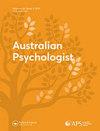双相情感障碍心理干预的个人康复:系统回顾
IF 2
4区 心理学
Q2 PSYCHOLOGY, MULTIDISCIPLINARY
引用次数: 0
摘要
摘要目的心理干预是双相情感障碍治疗的一个重要方面。然而,迄今为止,许多干预措施都侧重于临床康复结果,如预防复发,而不是希望和有意义的生活的个人康复结果。这篇综述的目的是识别、评估和综合有关双相情感障碍患者康复导向心理干预的可用性、内容和疗效的信息。方法采用系统评价和荟萃分析首选报告项目(PRISMA)进行系统评价。检索到的数据库包括PubMed、EMBASE、PsychINFO、CINAHL和SCOPUS。纳入标准是对诊断为双相情感障碍的参与者进行心理干预评估的研究,并对个人康复结果进行定性或定性评估。结果共收录5篇文章(N = 507)。所有研究(N = 5) 采用基于认知行为疗法(CBT)原理的以康复为重点的干预措施,并且是定量设计。两项研究采用了在线、自定节奏的干预措施,两项研究使用了团体心理教育项目,一项研究使用个人手动治疗。所有研究都发现,个人康复有显著改善。没有任何研究对个人康复结果进行定性评估。结论虽然数据有限,但初步证据表明,以康复为导向的干预措施可能对改善双相情感障碍患者的个人康复有效。本综述的局限性包括关注那些评估个人康复的研究。临床医生应考虑以个人康复为导向的干预措施来治疗双相情感障碍,并作为实践的一部分进一步评估康复结果。关键点关于这个话题已经知道的内容:以康复为导向的项目可能对精神疾病患者有帮助。在一系列研究中,在混合精神病样本中发现了益处。同伴主导的康复计划也可以帮助管理一般样本的症状和复发。本主题补充道:人们对开发双相情感障碍的康复干预措施越来越感兴趣。这篇综述指出,评估恢复结果的CBT研究发现了改善。治疗师应考虑在双相情感障碍的治疗中使用以恢复为重点的方法。本文章由计算机程序翻译,如有差异,请以英文原文为准。
Personal recovery in psychological interventions for bipolar disorder: a systematic review
ABSTRACT Objective Psychological interventions comprise a critical aspect of treatment for bipolar disorder. However, many interventions to date have focussed on clinical recovery outcomes, such as relapse prevention, rather than preferred personal recovery outcomes of hope and a meaningful life. The aim of this review was to identify, appraise and synthesise information regarding the availability, content and efficacy of recovery-oriented psychological interventions for individuals with bipolar disorder. Methods A systematic review was conducted using the Preferred Reporting Items for Systematic Reviews and Meta-Analyses (PRISMA). Databases searched included PubMed, EMBASE, PsychINFO, CINAHL and SCOPUS. The inclusion criteria were studies that assessed a psychological intervention in participants with a diagnosis of bipolar disorder and assessed personal recovery outcomes either qualitatively or qualitatively. Results Five articles were included from the titles assessed (N = 507). All studies (N = 5) employed recovery-focussed interventions based on principles of Cognitive Behaviour Therapy (CBT) and were quantitative designs. Two studies used online, self-paced interventions, two studies used group psychoeducation programs, and one study used individual manualised therapy. All studies found a significant improvement in personal recovery. No studies assessed personal recovery outcomes qualitatively. Conclusions Whilst data is limited, initial evidence suggests that recovery-oriented interventions may be effective in improving personal recovery in people living with bipolar disorder. Limitation of this review include a focus on those studies that assessed personal recovery. Clinicians should consider personal recovery-orientated interventions in the treatment of bipolar disorder and further assess recovery outcomes as part of practice. KEY POINTS What is already known about this topic: Recovery-orientated programs may be helpful for people living with a mental illness. Benefits have been found in mixed psychiatric samples in a range of studies. Peer led recovery programs may also assist manage symptoms and relapse in general samples. What this topic adds: There is growing interest in developing recovery interventions for bipolar disorder specifically. This review noted that CBT studies assessing recovery outcomes found improvements. Therapists should consider the use of recovery-focussed approaches in the treatment of bipolar disorder.
求助全文
通过发布文献求助,成功后即可免费获取论文全文。
去求助
来源期刊

Australian Psychologist
PSYCHOLOGY, MULTIDISCIPLINARY-
CiteScore
3.70
自引率
5.30%
发文量
32
期刊介绍:
The Australian Psychologist is the official applied practice and public policy journal of the Australian Psychological Society. As such, the journal solicits articles covering current issues in psychology, the science and practice of psychology, and psychology"s contribution to public policy, with particular emphasis on the Australian context. Periodically, Australian Psychological Society documents, including but not limited to, position papers, reports of the Society, ethics information, surveys of the membership, announcements, and selected award addresses may appear in the journal.
 求助内容:
求助内容: 应助结果提醒方式:
应助结果提醒方式:


